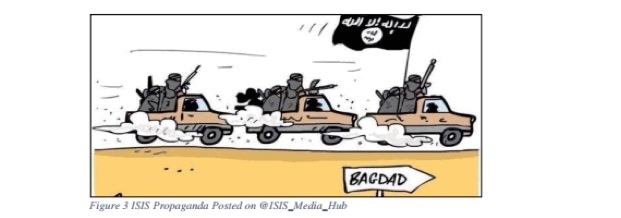Twitter: “Not even the thinnest of reeds connects Twitter to this terrible event.”
On Tuesday, the family of Nohemi Gonzalez, a woman killed in terrorist attacks in Paris in November 2015, sued the three tech giants in federal court for unspecified damages. In a 39-page civil complaint, the family’s attorneys argue that the defendants provide “material support to ISIS”—as the companies make money off of ads that run against this propaganda and therefore are in violation of a civil provision of an anti-terrorism law.
However, according to several lawyers and law professors that Ars spoke with, the trio of companies in Gonzalez v. Twitter will likely argue that they are not liable under Section 230 of the Communications Decency Act. (The companies have not yet formally responded to the case in court.)
ISIS uses Twitter to post guidelines and promotional videos called “mujatweets.”
For its part, Twitter spokesman Nu Wexler told Ars in a statement that while the company sympathizes with the family’s situation, “We believe this lawsuit [Gonzalez] is without merit.”
According to Paul Alan Levy, an attorney with Public Citizen who has litigated several Section 230 cases previously, the Gonzalez case is ludicrous on its face.
“If it weren’t for the printing press and the Postal Service, none of this bad speech would be disseminated,” he e-mailed. “So let’s sue the estate of Johannes Gutenberg.”
Foundation of the modern Web
No provider or user of an interactive computer service shall be held liable on account of—
(A) any action voluntarily taken in good faith to restrict access to or availability of material that the provider or user considers to be obscene, lewd, lascivious, filthy, excessively violent, harassing, or otherwise objectionable, whether or not such material is constitutionally protected.
Communications Decency Act doesn’t immunize Modelmayhem.com from legal liability.
“It’s a dangerous path to go down: what we’re worried about is what the consequences are, as to what a platform will do if they have to fear for this kind of liability,” Aaron Mackey, a legal fellow at EFF, told Ars.
Similarly, Venkat Balsubramani, a Seattle-based attorney, told Ars that Gonzalez “does not even qualify as a long shot.”
For his part, Eric Goldman, a law professor at Santa Clara University, also told Ars that he didn’t think Gonzalez would get very far—particularly given that the language of the civil complaint is nearly identical to Fields, which didn’t pass muster, albeit before a different judge.
“As usual, when a plaintiff’s lawyer comes up with a new legal theory to expand legal liability, it inspires copycat and analogous lawsuits that start percolating through the court system,” he e-mailed Ars. “I’m confident this vector of litigation will not be successful for plaintiffs, but it may take months or years for plaintiffs’ lawyers to internalize that message.”
For shame?
CDA Section 230 prevents “the speech-chilling threat of the heckler’s veto.”
However a recent decision by a full panel (en banc) of the 9th Circuit Court of Appeals ruled against a modeling website earlier this month, finding that the site could, in fact, be sued for failing to tell aspiring models that it knew that would-be rapists trolled the site.
So why would a lawsuit whose arguments were recently rejected by a federal judge even make the attempt?
“Basically, it’s a classic public shaming technique,” Adam Thierer, a research fellow at the Mercatus Center at George Mason University. “Those filing such suits probably feel that even if it is unlikely, they will prevail in court, their efforts might still win in the court of public opinion.”
One of the lawyers representing the Gonzalez family, Keith Altman, told Ars nearly as much. He argued that while his theory that CDA Section 230 does not apply here has yet to be validated, if he can get these companies to clamp down on undesirable speech, then that would be a win.
“If you could keep them from regenerating their accounts, you win the whack-a-mole game,” he said. “Number one: whether we win or lose, the public wins. This lawsuit has caused everybody to win because there is no social utility to ISIS conducting operations on social media websites.”
The two sides are set to appear before a magistrate judge in Oakland in September 2016.
Source: arstechnica.com





Be the first to comment on "It’ll Be Very Hard for Terrorism Victim’s Family to Win Lawsuit Against Twitter"